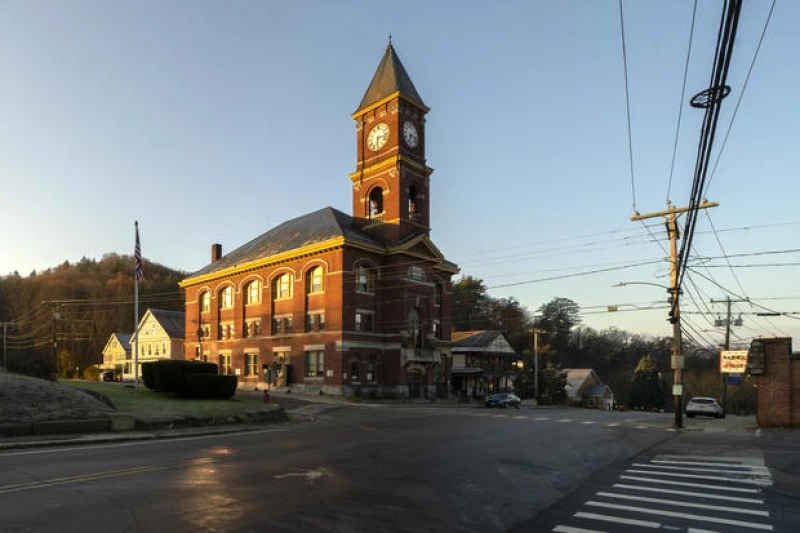Geoffrey Holt was a humble caretaker in Hinsdale, New Hampshire. He lived a simple and curious life as the caretaker of a mobile home park in the town.
Residents often saw Holt around town wearing threadbare clothes. He could be found riding his lawnmower, going to the convenience store, or parked along the main road reading a newspaper or watching cars pass by.

Although he did odd jobs for others, Holt rarely left town. Despite having taught driver's education to high schoolers, he had given up driving a car and instead opted for a bicycle and eventually a lawnmower. His mobile home in the park was sparsely furnished, lacking a TV or computer. In fact, the legs of his bed went through the floor.
"He seemed to have what he wanted, but he didn't want much," said Edwin "Smokey" Smith, Holt's best friend and former employer.
However, after Holt's death earlier this year, a secret was revealed: he was a multimillionaire. And not only that, he had given away his entire fortune to the community of Hinsdale, which consists of 4,200 people.
In his will, Holt left brief instructions for his $3.8 million fortune. The money was to be given to the town of Hinsdale to benefit the community in the areas of education, health, recreation, and culture.
"I don't think anyone had any idea that he was that successful," said a local resident who'd occasionally wave at Holt from his car. "I know he didn't have a whole lot of family, but nonetheless, to leave it to the town where he lived in. ... It's a tremendous gift."
How the money could be used
The money could go far in this Connecticut River town sandwiched between Vermont and Massachusetts with abundant hiking and fishing opportunities and small businesses. It's named for Ebenezer Hinsdale, an officer in the French and Indian Wars who built a fort and a grist mill. In addition to Hinsdale's house, built in 1759, the town has the nation's oldest continually operating post office, dating back to 1816.
There's been no formal gathering to discuss ideas for the money since local officials were notified in September. Some residents have proposed upgrading the town hall clock, restoring buildings, maybe buying a new ballot counting machine in honor of Holt, who always made sure he voted. Another possibility is setting up an online drivers' education course.
Organizations would be able to apply for grants via a trust through a local charitable foundation, drawing from the interest, roughly about $150,000 annually.
Hinsdale will "utilize the money left very frugally as Mr. Holt did," said the town administrator.
Holt's best friend, a former state legislator who became the executor of Holt's estate, had learned about his fortune in recent years.
John Holt, who passed away at the age of 82 in June, was a man of many interests. He had a passion for collecting model cars and train sets, which filled his rooms and even extended into a shed. Holt was also an avid reader and had a collection of books about history, with a particular focus on Henry Ford and World War II. In addition, he had an extensive record collection that included works by Handel and Mozart.
A Growing Nest Egg
Holt, who had previously worked as a production manager at a grain mill in Brattleboro, Vermont, was also a shrewd investor. He would often sit by a brook and study financial publications, hoping to make wise investment decisions. Holt confided in a friend, Smith, about his successful investments and his uncertainty about what to do with his newfound wealth. Smith suggested that he give back to the town that had been a significant part of his life.
"I was surprised when I learned that he had left all of his money to the town," Smith said.
According to Smith, one of Holt's earliest investments was in the field of communications, long before cellphones became popular. Holt's sister, Alison Holt, who is 81 years old and resides in Laguna Woods, California, recalled their father's emphasis on not wasting money and the importance of investing.
Unlikely Path to Millions
"Geoffrey had a learning disability. He had dyslexia," she said. "He was very smart in certain ways. When it came to writing or spelling, he was a lost cause. And my father was a professor. So, I think that Geoff felt like he was disappointing my dad. But maybe socking away all that money was a way to compete."
She and her brother grew up in Springfield, Massachusetts. Their father, Lee Holt, taught English and world literature at American International College. Their mother, Margaret Holt, had a Shakespearean scholar for a dad. She was an artist who "absorbed the values of the Quaker Society of Friends," according to her obituary. Both parents were peace activists who eventually moved to Amherst and took part in a weekly town vigil that addressed local to global peace and justice issues.

Their children were well-educated. Geoffrey went to boarding schools and attended the former Marlboro College in Vermont, where students had self-designed degree plans. He graduated in 1963 and served in the U.S. Navy before earning a master's degree from the college where his father taught in 1968. In addition to driver's ed, he briefly taught social studies at Thayer High School in Winchester, New Hampshire, before getting his job at the mill.
Alison remembers their father reading Russian novels to them at bedtime. Geoffrey could remember all those long names of multiple characters.
The shaping of a life
He seemed to borrow a page from his own upbringing, which was strict and frugal, according to his sister, a retired librarian. His parents had a vegetable garden, kept the thermostat low, and accepted donated clothes for their children from a friend.
She said Geoffrey didn't need a lot to be happy, didn't want to draw attention to himself, and might have been afraid of moving. He once declined a promotion at the mill that would have required him to relocate.
"He always told me that his main goal in life was to make sure that nobody noticed anything," she said, adding that he'd say "or you might get into trouble."
They didn't talk much about money, though he would ask her often if she needed anything.
"I just feel so sad that he didn't indulge himself just a little bit," she said.
But he never seemed to complain. He also wasn't always on his own, either. As a young man, he was briefly married and divorced. Years later, he grew close to a woman at the mobile home park and moved in with her. She died in 2017.
Neither Alison nor Geoffrey had any children.
Stroke takes its toll
Holt suffered a stroke a couple of years ago and worked with therapist Jim Ferry, who described him as thoughtful, intellectual and genteel, but not comfortable with following the academic route that family members took.
Holt Finds Joy in Lawn Mowing Despite Mobility Issues
Holt, a stroke survivor, has found solace and connection with the outdoors through his love for lawn mowing. Despite facing mobility issues, he has always seen it as a way to relax and serve the people in his trailer park community.
"I think for Geoff, lawn mowing was relaxation, it was a way for him to kind of connect with the outdoors," said Ferry. "I think he saw it as service to people that he cared about, which were the people in the trailer park that I think he really liked because they were not fancy people."
Recently, Holt received a surprise gift - a new mower from his community in Hinsdale, New Hampshire. The residents are hoping that this act of kindness will bring attention to their often overlooked corner of the state.
"It's actually a forgotten corner in New Hampshire," said Ann Diorio, a member of the local planning board. "So maybe this will put it on the map a little bit."







